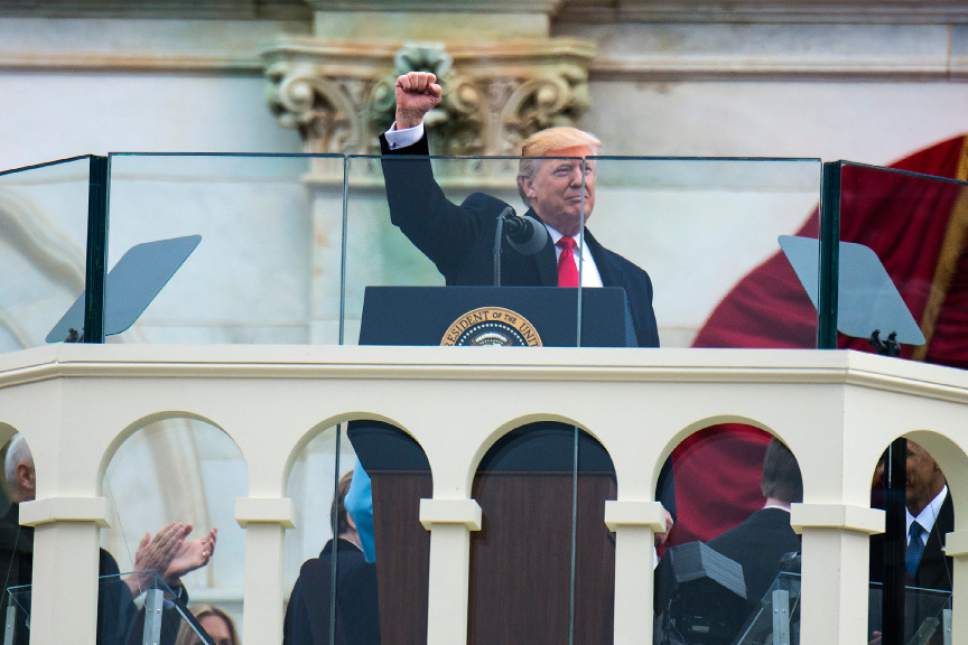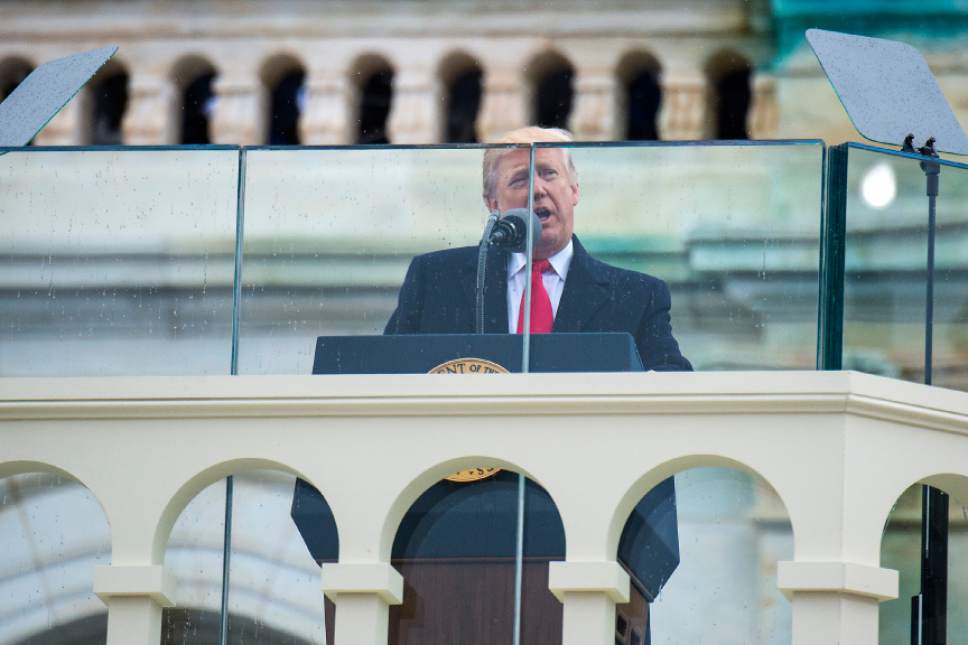This is an archived article that was published on sltrib.com in 2017, and information in the article may be outdated. It is provided only for personal research purposes and may not be reprinted.
President Donald Trump's inaugural address was infused with religious language, reflecting a rhetorical shift from the nation's new leader. His previous speeches have not usually referred to the Bible or God.
Trump's most explicitly religious mention came in the middle of the speech when he made a biblical reference to Psalm 133.
"The Bible tells us how good and pleasant it is when God's people live together in unity," Trump said. "We must speak our minds openly, debate our disagreements honestly, but always pursue solidarity."
Just before that line, he said, "When you open your heart to patriotism, there is no room for prejudice."
"I wondered if many heard an echo of the far more common turn of phrase 'open your heart to Jesus,' " said Peter Manseau, author of "One Nation, Under Gods: A New American History." Manseau said Trump combined spiritual references with "America first" rhetoric, a reflection of "a desire to fuse the languages of faith and nation."
Trump also alluded to the strength of the country through its military and law enforcement, saying, "There should be no fear. We are protected, and we will always be protected. ... And, most importantly, we will be protected by God."
The Psalm 133 quote, said Mark Silk of Trinity College, "was excellent as a piece of rhetoric and as subtle self-promotion." In the second verse of that chapter, it references the anointing of Aaron as a priest, perhaps a likening of American unity to Trump's anointing as president.
Another section of his speech sounded like it could be a reference to a biblical passage. "We do not seek to impose our way of life on anyone, but rather to let it shine as an example," Trump also said. "We will shine for everyone to follow."
Though he didn't explicitly make the connection, the line sounded like Matthew 5:16, which says, "Let your light shine before others, that they may see your good deeds and glorify your father in heaven."
"We will reinforce old alliances and form new ones," he said, "and reform the world against radical Islamic terrorism, which we will eradicate from the face of the Earth."
It was the only mention of a religious group in his speech.
"I find it intriguing that the first mention of 'religion' was not the commitment to love, not to justice, not to protecting those who find themselves weak and vulnerable, but a vague — and unobtainable — promise to eradicate 'radical Islamic terrorism,'" said Omid Safi, a professor at Duke University. "The millions of American citizens of Muslim persuasion are not seen, not acknowledged, but are talked over."
Eboo Patel, who runs Interfaith Youth Core, said Trump missed an opportunity to bridge divides, especially compared to when outgoing President Barack Obama was first inaugurated.
"I remember the electric current that went through the audience when he spoke of America's 'patchwork heritage' as our essential strength, and then dignified the contributions of various religious and philosophical communities by name," Patel said. "I listened for a similar grace note in Mr. Trump's address and was left disappointed."
Referring to America's children, Trump said, "they are infused with the breath of life by the same almighty creator."
When Trump has spoken about faith, it has usually been to appeal to evangelical voters, such as his speech at Liberty University a year ago. While more infusion of faith in his speech may have signaled a shift for Trump personally, it had little of the unifying and religious rhetoric compared with other inaugural addresses, said Amy Black, a political science professor at Wheaton College. Usually, incoming presidents say little about policy and focus instead on shared values, unity, democracy and respect for governing institutions, she said.
"I was struck by how the speech seemed to jump between criticisms of our current circumstances and broad promises about how life will now improve for all Americans with occasional interjections of the patriotic and civil religious themes that are more common in inaugural addresses," Black said.
Trump also defied convention by inviting six religious leaders (usually there have been two) to participate in the ceremony, either reading Scripture or offering prayers. Paula White's prayer, she said, was striking for its strong evocations of Christian nation themes.
"Let these United States of America be that beacon of hope to all people and nations under your dominion, a true hope for humankind," White prayed.
In past years, those who pray in the name of Jesus Christ, such as Franklin Graham in 2000, have sparked controversy. This year, Black said, it was surprising so many invocations used the name of Jesus in the ceremony since the prayers have historically had more broad religious appeal.
Graham stirred reactions for saying that the rain Friday was a sign of God's blessing.
"There remains a deep divide in this country between those who believe that religious traditions should be a recognized and celebrated part of public life, and those who believe that their particular religious tradition should publicly recognized as uniquely true," said Rabbi Brad Hirschfield, president of CLAL-The National Jewish Center for Learning and Leadership.
The list of clergy at the inauguration included a Catholic, a Jew and four evangelicals, though Americans who don't identify with any religion at all are growing in numbers. "As America is becoming more religiously diverse, this inaugural ceremony had the most sectarian, exclusively Christian rhetoric in memory," wrote Robert P. Jones, president of Public Religion Research Institute.
Some were disappointed that Trump didn't acknowledge people who don't belong to faith at all.
"It's one thing to say God will protect us all; it's another for a president to act like Christianity is the only faith that matters in America," said Hemant Mehta, a popular atheist blogger.
Obama said in his 2009 address, "We are a nation of Christians and Muslims, Jews and Hindus, and no-believers." It was the first time nonbelievers had been mentioned in an inaugural address.
"It was purely symbolic, but it meant a lot," Mehta said. "Trump didn't even acknowledge our existence. And I have no reason to think that'll change during his administration."





